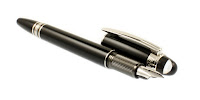It is said that with a treasured fountain pen, the writer assumes an air of accomplishment as they practice the art of fine handwriting. As we write, we express our innermost thoughts and passions to the world. A pen in the hand becomes an extension of the body and soul. Writing with a fountain pen is a romantic link to our past culture that allows a personal expression that cannot be emulated by today’s sterile forms of communication. Rising above the times a fountain pen will stay, and forever remain, the purest means of self-expression.
Hepworth Dixon specialises in the restoration of vintage fountain pens. We also offer a range of classic, modern classic and new-old-stock writing instruments.
What is a vintage fountain pen?
Fountain pens have been around for the past 130 years. Writing instruments with the ability to carry a self contained supply of ink were only introduced in the late 1800's. Lewis Waterman patented the first “practical” fountain pen in 1884, a design which allowed the controlled flow of ink from a reservoir to nib tip.
 |
| Vintage Parker Duofold Lucky Curve Button Filling Fountain Pen Manufactured 1926 |
 |
| Classic Parker Duofold Centennial Cartridge/Convertor Filling Fountain Pen Manufactured 1988 |
Time is not the only criteria used to define vintage, but rather other elements such as enduring style, perceived quality and accrued value. Vintage pens usually come from a different era, but the definition should not be confined only in years.
Why call some used pens “vintage”?
Much like you can have a great vintage wine from a few years back, so too can you have an outstanding vintage pen that is not technically that old. Some fountain pens are rare, simply because of their age. These often transcend the definition of vintage and move into the category of antique.
The value of these items illustrates that with time, vintage writing instruments can become rare and therefore more sought-after with increased value as a result.
 |
| Modern Classic Montblanc Starwalker Cartridge Filling Fountain Pen Introduced 2003 |
 |
| Vintage Classic Montblanc Meisterstuck 144 Piston Filling Fountain Pen Produced early 1950's |
So what is a "classic"? Let us begin with a dictionary definition.
Clas-sic (kla-sik) adj.
Belonging to the highest rank or class.
Serving as the established model or standard.
Having lasting significance or worth; enduring.
Formal, refined and restrained in style.
Simple and harmonious; elegant.
 |
| Vintage Classic Parker 51 Blue Diamond Vacuum Filling Fountain Pen Manufactured in 1947 |
What defines a fountain pen as being a "classic" ?
A Classic - "A pen considered to be the best of it's kind. It marks a high point in development for latter generations". Certainly no one would disagree that the Parker 51 (pictured above) fore-fills all the elements of dictionary definition of classic.
For different reasons, the Pelikan 100 and Sheaffer PFM (pictured below) should, also be considered as 'Classic' fountain pens of their era. The Pelikan 100 was the first fountain pen to adopt a 'Piston' filling system, first marketed in 1929.
Sheaffer introduced a plunge vacuum filling fountain pen with barrel reservoir in 1935. In 1950 the 'Touchdown' evolved, replacing the barrel reservoir with an air pressure operated compression sac. A refinement in 1952, introducd a retractable snorkel filling tube. These were forerunner's to the 1959 Sheaffer PFM, probably the most technically advanced (perhaps over complicated) fountain pen ever produced.
 |
| Vintage Classic Pelikan 100 N Piston Filling Fountain Pen Manufactured c.1939 |
 |
| Classic Sheaffer PFM Snorkel, Plunge Vacuum Filling Fountain pen c.1959 |
It becomes obvious, when attempting to clarify terms "Classic" and "Vintage" with regard to used fountain pens, there is no definitive answer. In conclusion, this remains a 'grey' area.
Outcome!
We have previously stated that pen definition "should not be confirmed only in years". Pre-defined 'pigeon holes' are however necessary to classify used fountain pens which are available for sale. This can only be achieved, in our opinion, based on manufacturing date or era.
Hepworth Dixon use the following categories when describing pens for sale:
Modern Classic - Post 1990 (specific model no longer produced)
Classic - 1970 to 1989
Late Vintage - 1950 to 1969
Early Vintage - 1920 to 1949
Antique - Pre 1920
An additional category 'NOS' new old stock. Used to describe a fountain pen model which is no longer produced, is contained within original packaging and has never been inked.
All Hepworth Dixon vintage fountain pens are sold in full working order, having been carefully restored to period specification. Our classic fountain pens are all scrupulously checked for functionality, repairs (if required) carried out, fully serviced and finally write tested.